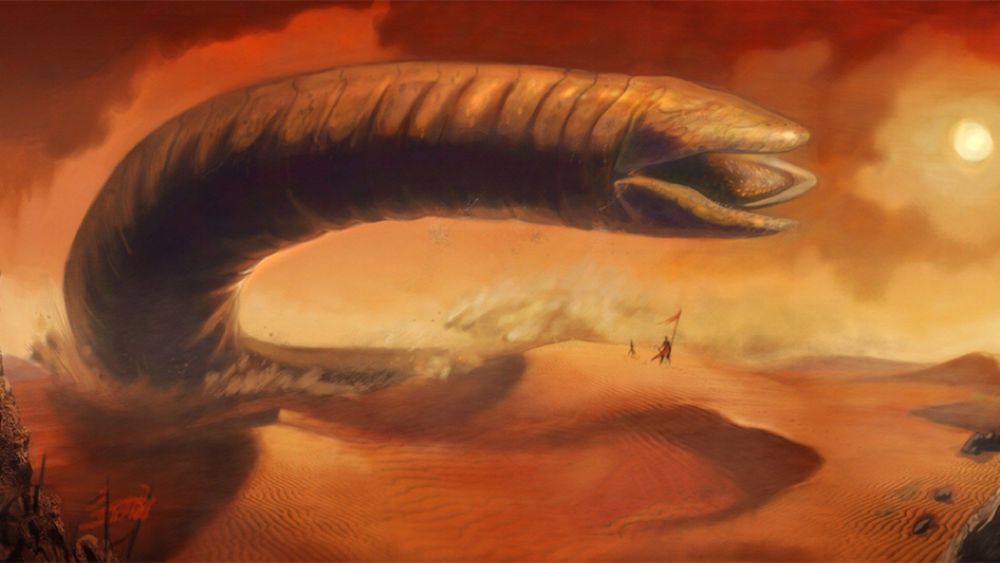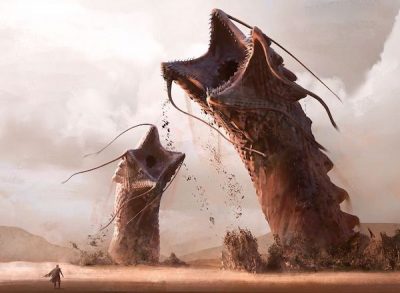✉️ Good Thought 9
Goldilocks & Sandworms, or How to tell great story
Welcome to Good Thought, a newsletter about fresh ideas for purposeful living in the 2020s.
I’m Aaron Nesmith-Beck. I founded Atman, one of the first legal psilocybin retreats, and my writing at Freedom & Fulfilment has over 1M pageviews. You can learn more about me here.
If you’re a new reader, you can subscribe below. You can unsubscribe at any time with the link at the bottom of the email.
You can read past issues of Good Thought here.
Goldilocks & Sandworms, or How to tell great story

Goldilocks
You can read this (and all life on earth exists) because our planet is the perfect distance from the sun. It orbits in a band of space called the circumstellar habitable zone, or more commonly, the Goldilocks zone.
I want to suggest another kind of Goldilocks zone, within which lies the key to great storytelling. It is the space between the mundanity of everyday life and the realm of pure archetype. Let’s call it the narrative Goldilocks zone.
Everyday life is hyper-specific, ordinary, routine. The minutiae is detailed but dull. Watching a random two-hour slice of your neighbour’s life probably isn’t very interesting to many people (not even your neighbour). Distraction is widespread and addictive because there often just isn’t that much going on. Most lives don’t make great stories.
Pure archetype, on the other hand, is too abstract and general to create story. The Hero’s Journey is an archetypal narrative, but it’s not a story. The Epic of Gilgamesh is a story, The Odyssey is a story, Star Wars is a story. You can’t know “the wise old mentor”, but you can know Merlin the wizard, Gandalf the Grey, Obi-Wan Kenobi. We know archetypes through individual characters, not the other way around.
Regular life is too ordinary and specific to make great story. Pure archetype is a description of a pattern, not a story itself. The narrative Goldilocks zone in between is where great story lives.
Sandworms
The following contains spoilers for the book Dune
Let’s take Dune as an example. I recently reread it and was struck by this pattern. Dune is a great story because all of its key elements strike a beautiful balance between the familiar everyday and the purely archetypal. It’s supercharged, gripping, larger than life, yet somehow deeply relatable. Here are some examples:
- Hyper-perceptiveness from Bene Gesserit training. The scene at the dinner table where Paul observes the subtext and subtle shifting power dynamics of a politically charged conversation. Perceptive people (the types of people who like books like Dune) resonate with some of this in their own experience.
- Paul’s prescience is superhuman, yet graspable, comprehensible. His near-godlike power can even feel relatable (!) Who hasn’t felt the overbearing sense of a premonition, or held a deep intuition about how the future will unfold?
- The Voice from Bene Gesserit training. The ability to control other people’s behaviour simply by changing the tone of one’s voice is exaggerated fiction, but powerful and charismatic people actually do something like this all the time.
- Paul is the ultimate hero, saviour, messiah. Muad’Dib, the chosen prophet to save the planet and lead his people to freedom. Who among us hasn’t felt that we’re special or different at some point in our lives? That we may be destined for great things? Each of us is the central hero, the chosen one in the story of our own life.
- Dune, a planet so dry and desolate that water conservation forms the bedrock of the native society. Sweat, urine and blood must be preserved at all costs to be transformed into water. The ultimate man vs. nature conflict. One misstep in the desert gets you swallowed by one of these guys…

Sandworms, the dragon of chaos of the desert sea, the ultimate monster
- Spice, the ultimate psychoactive. Stimulants can make us feel we can accomplish anything. Psychedelics can take us outside of ourselves, grant us visions of the past (and future, of sorts), allow us to live other lives, connect us with cosmic unity.
- Spice, the ultimate commodity. He who controls the spice controls the universe. Gold, silver, tea, oil.
- Paul (and Jessica’s) journey from outsider to insider. Paul is foreign-born nobility who fulfills the ancient prophecy to become the saviour. Like a mythical hero (and perhaps, a great startup founder), he is both the ultimate outsider and the ultimate insider with the Fremen.
Each element of this story (and I’m sure there are more!) is a ramped-up version of something specific and real, yet believable and relatable enough to float within the narrative Goldilocks zone. This is at least part of what makes Dune a great story.
🕶️ Other cool things (story edition)
📚 Book recommendation: Story by Robert McKee
Focused on storytelling for screenwriting but contains insightful and broadly applicable principles. I’ve read less than a quarter, but that at least, in my opinion, is well worth reading.
📖 Good short read: Storytelling: Harmon vs. McKee by Venkat Rao
Addendum to the above (Rao is not a fan of McKee). Includes discussion of highly compressed (and highly useful) “caveman’s grunt” version of the Hero’s Journey.
📖 Good short story: Understand by Ted Chiang
What would it feel like, and what would you do, if you kept getting smarter, and smarter, and smarter… beyond all previous human capacity? This is one of my favourite short stories.
📖 Good short story: A Little Cloud by James Joyce
How might your life turn out if you never conquer your fears and follow your dreams? This is another one of my favourite short stories.
🎥 Good video essay: How to Write a Great Ending
Why the ending of The Matrix is great, and the ending of Casino Royale sucks, among other things. High quality video essays are one of the saving graces of Youtube these days.
Thanks for reading Good Thought! If you enjoyed it, why not subscribe?
© 2021 ✉️Good Thought
